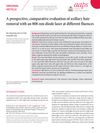 September 2020 in “Journal of Health, Medicine and Nursing”
September 2020 in “Journal of Health, Medicine and Nursing” A 10-year-old boy with abnormal genital development had surgery and tests to find the cause and plan treatment.
 February 2020 in “Biophysical journal”
February 2020 in “Biophysical journal” Zebrafish with mutations similar to human Cantú Syndrome have heart cells with altered channel properties, making them a good model to study the condition.
 April 2019 in “Archives of aesthetic plastic surgery”
April 2019 in “Archives of aesthetic plastic surgery” Higher fluences in 808-nm diode laser treatments are more effective for axillary hair removal.

PCOS is a common hormonal disorder with symptoms like irregular periods and excess hair growth, managed with lifestyle changes and medications.

Accurate diagnosis and timely, tailored treatments improve outcomes in obstetrics and gynecology.
 October 2018 in “InTech eBooks”
October 2018 in “InTech eBooks” The most effective treatments for hair loss are minoxidil, finasteride, PRP, and hair transplants, with steroids and immunosuppressants for autoimmune types.
 September 2018 in “The Medical Journal of Cairo University/The Medical Journal of Cairo University”
September 2018 in “The Medical Journal of Cairo University/The Medical Journal of Cairo University” Polarized light therapy helps hair regrowth in alopecia areata patients.
 July 2018 in “Elsevier eBooks”
July 2018 in “Elsevier eBooks” The most common cause of hair loss in children is tinea capitis, followed by alopecia areata and telogen effluvium.
 January 2018 in “Springer eBooks”
January 2018 in “Springer eBooks” Terbinafine is the most effective medicine for fungal nail infections, especially for diabetics and those with weak immune systems.

Tailored nonsurgical cosmetic procedures are crucial for safely treating diverse skin types, especially skin of color.

Different scalp and hair disorders are more common in certain ethnic groups, with the most common being androgenetic alopecia, which is treated with medications like minoxidil and finasteride.
 November 2017 in “Elsevier eBooks”
November 2017 in “Elsevier eBooks” PCOS is a genetic disorder affecting women's reproductive health, with treatments focused on symptoms like insulin resistance and fertility.
 May 2017 in “Journal of microscopy and ultrastructure”
May 2017 in “Journal of microscopy and ultrastructure” Water quality affects mineral content in hair, and coconut oil can protect against damage.
 January 2017 in “Springer eBooks”
January 2017 in “Springer eBooks” The document explains various skin conditions and their treatments.

Skin stem cells are crucial for maintaining and repairing skin, with potential for treating skin disorders and improving wound healing.
 January 2016 in “Journal of SAFOG”
January 2016 in “Journal of SAFOG” Girls with PCOS and menstrual disorders have notably higher androgen hormone levels.
 August 2015 in “Postgraduate obstetrics & gynecology”
August 2015 in “Postgraduate obstetrics & gynecology” Women with PCOS often have metabolic issues like insulin resistance and a higher risk of diabetes and abnormal lipid levels.
 August 2015 in “Postgraduate obstetrics & gynecology”
August 2015 in “Postgraduate obstetrics & gynecology” Women with PCOS often have insulin resistance, abnormal lipid levels, and a higher risk of diabetes and heart disease; lifestyle changes and medication like metformin can help manage these risks.
 February 2013 in “Journal of the American Academy of Dermatology”
February 2013 in “Journal of the American Academy of Dermatology” Iron supplements may reverse premature hair graying caused by iron deficiency.
 June 2011 in “CRC Press eBooks”
June 2011 in “CRC Press eBooks” Low-Level Laser Therapy can stimulate healing and cell function, potentially leading to wider medical use.
 September 2009 in “Pediatric Dermatology”
September 2009 in “Pediatric Dermatology” UVB is good for a skin condition in Asian kids, a lotion works for head lice, a drug helps with a skin blistering disorder, a foam reduces itchiness in skin inflammation, birthmarks can be more widespread, and criteria for a neurocutaneous disorder were agreed upon.
 January 2009 in “Elsevier eBooks”
January 2009 in “Elsevier eBooks” Some plant-based treatments may help with ovary function, insulin resistance, and excess male hormones in PCOS, but more research is needed to confirm their safety and effectiveness.
 October 2008 in “Clin-alert”
October 2008 in “Clin-alert” Certain medications can reduce mortality risk in COPD patients, but others can increase risks of cardiovascular issues, postoperative delirium, and other adverse effects.
 July 2008 in “Expert Review of Dermatology”
July 2008 in “Expert Review of Dermatology” Proper planning for hair transplants is crucial for natural results, with careful patient selection and strategic graft placement being key factors.
 January 2007 in “Elsevier eBooks”
January 2007 in “Elsevier eBooks” The document concludes that hair transplantation for Asians should consider unique scalp and hair traits, use small grafts, and combine surgery with medication like finasteride and minoxidil for best results.
 February 2006 in “Journal of The American Academy of Dermatology”
February 2006 in “Journal of The American Academy of Dermatology” Terbinafine is more effective than itraconazole for toenail fungus, especially in older patients, and debridement improves its effectiveness.
 September 2003 in “Current Paediatrics”
September 2003 in “Current Paediatrics” The document concludes that accurate diagnosis and understanding the type of hair disorder are crucial for treating hair loss in children.
 July 2003 in “Journal of Cutaneous Medicine and Surgery”
July 2003 in “Journal of Cutaneous Medicine and Surgery” Blood pressure drugs can cause skin lupus, but it improves after stopping the drug. The glycoprotein D vaccine works against genital herpes in some women, and the HPV-16 vaccine reduces HPV-16 infection and related diseases. More frequent light therapy clears psoriasis faster. A cream called imiquimod effectively treats a type of skin cancer. Iron supplements don't necessarily help with chronic hair loss in women.
 July 2003 in “Journal of Cutaneous Medicine and Surgery”
July 2003 in “Journal of Cutaneous Medicine and Surgery” Various skin conditions like cutaneous lupus erythematosus, psoriasis, and basal cell carcinoma can be effectively treated with antihypertensive agents, NB-UVB phototherapy, and imiquimod cream respectively. Vaccines are effective against genital herpes and HPV-16 infection. Early intervention is crucial for conditions like diabetic foot ulcers and neonatal herpes. Certain dyes can cause hand dermatitis, and there's a link between smoking/drinking and psoriasis in men. No direct link was found between low iron levels and chronic hair loss in women.
 July 2003 in “Journal of Cutaneous Medicine and Surgery”
July 2003 in “Journal of Cutaneous Medicine and Surgery” Some medications can improve skin conditions, while lifestyle factors like smoking and drinking may worsen them; treatments like monoclonal antibodies and imiquimod cream show promise for certain skin diseases.






























